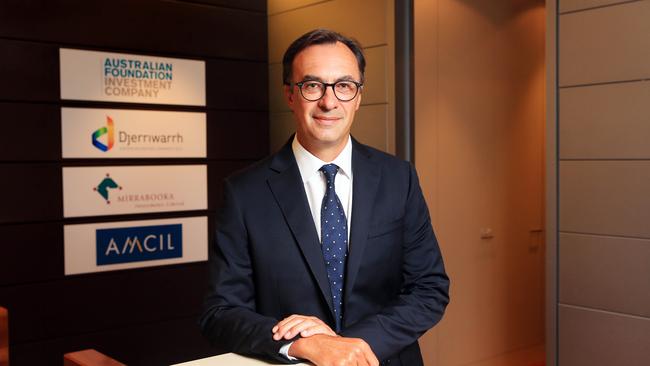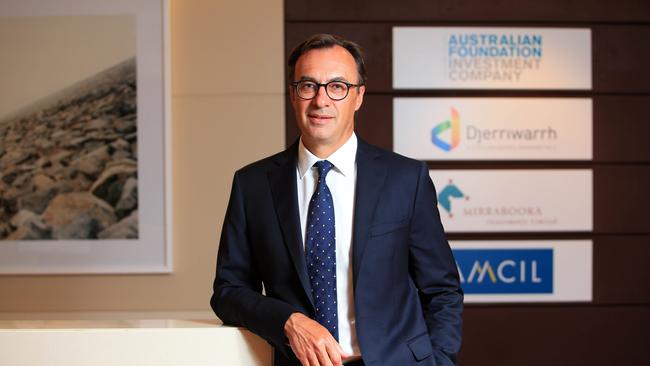AFIC boss Mark Freeman is buying the current dips in the sharemarket
Australian Foundation Investment Co boss Mark Freeman has made three big bets on the current, volatile market. See which stocks the market picker has bought.

Mark Freeman might just be one of the most courageous funds managers in the market at the moment when you consider his three big bets.
He sold down CBA as it rallied hard, deploying that cash into the current market turmoil, and backed, not just with words but cold hard cash, James Hardie which right now is the whipping boy for other professional investors who are dumping the stock.
The chief executive of Australian Foundation Investment Company, the nation’s largest and oldest listed investment company, with an equities portfolio worth more than $9bn, isn’t being paid to just sit around and collect dividends for his mostly elderly and retired 160,000 shareholders — he also needs to pounce when the time is right.
“We use fear and panic to make these adjustments to our portfolio,” said Mr Freeman, who is the current steward of AFIC’s equities wealth, which has a prestigious reputation and history which stretches back to its creation in 1928.
“If a stock gets sold down to unrealistic levels around fear and panic, our instinct is to become a buyer because we did it during Covid, we did it during the global financial crisis. “And over a 100-year chart we have highlighted the market, over 100 years, we circled all the dips, world wars, tech wrecks, Covid, oil price crashes, all of them and whenever you had a significant market downturn it was only ever one thing — and that was a buying opportunity,” he told The Australian.
Mr Freeman said there is a caveat this time. “We think stocks have come back to ‘fair value’, but what we are doing now if there was another draw down in markets we would be ready to make some more significant buys, but concentrated.
“But. when this happens lots of companies will tempt you, and we need to be really focused on what are the great companies and when you have a significant draw down everything goes down and that’s the opportunity to buy what you think is best quality businesses at a good price.”
That philosophy has led AFIC to start picking up shares in James Hardie, which has been punished by the market for the price it is paying for US group Azek and the way the deal is structured — pushing many fundies to angrily sell down their stakes, or “rage selling”. AFIC is trying to think more long-term.
AFIC, chaired by former Medibank boss and one-time executive chair of venerable stockbroker Goldman Sachs JBWere Craig Drummond, often sets the standard for conservative and cautious investing in Australia amid the $50bn listed investment company sector.

The fund is part of a small cohort of traditional LICs that are conservative, invest in blue-chip companies and have incredibly low administrative and business expenses compared to the sizes of their portfolio. Case in point, AFIC has a management expense ratio of just 0.15 per cent.
These LICs often sit on piles of cash so they can be ready to pounce. Now is that time.
Mr Freeman, chief investment officer for AFIC from 2007 and anointed CEO in 2018, is able to deploy cash reserves now into the sliding market because of his first big bet. And for those who have been followers of the conservative Collins Street investment fund for decades, it will be clear how much a risk this was.
He decided to sell down some of AFIC’s giant, overweight and long held stake in every conservative and dividend-hungry investor’s favourite company: Commonwealth Bank. And he did this at a time when CBA shares were rallying strongly.
“It was a big call,” said Mr Freeman, who in January told The Australian he was getting nervous about CBA as its share price accelerated to above $160 to cap off a near 50 per cent gain in just 12 months.
“If you look at the P/E charts the long term average for CBA was around 15, it headed to 24 and 25 times. Yes, we love the company but at times we just have to say it is just too expensive.”
AFIC’s key raison d‘être over its 100-year history has been to harvest dividends from blue-chip stocks to pass on to its shareholders.
Typically these have been retirees and pensioners who aren’t chasing tech stocks or the “next big thing’ but rather are content with steady and growing dividends. Some capital appreciation is welcome too, but dividends are a key barometer for how AFIC is judged by shareholders.
CBA had been, since its float, the perfect candidate for AFIC and for most periods of the past few decades CBA has been the No. 1 or No. 2 top shareholding in its $9bn portfolio.
The fund’s most recent investment report, for March, showed it was sitting on $838m worth of CBA shares, to make up its biggest holding at 8.8 per cent of the portfolio.
But, Mr Freeman broke with history, not to mention weighty AFIC culture, to sell down, slightly, and get cashed up for what he always believed was a clearing out of overpriced equity markets just waiting for a trigger to dive.
That dive came with President Trump’s tariff announcement this month.
“Price to earnings ratios for Australian and US stockmarkets have been at very, very high levels, and we have been saying for a while we are very cautious and we were not sure what breaks that (high P/E level) but when it does it breaks very quickly.”
AFIC now sees “fair value” as P/E levels come down to longer-term averages, and the investment fund has waded into the market as some investors panic and sell.
“We go through it and we see very fair value, and fair value is good to buy good companies. But what we find is, though, that when you have these panic days and downdraft days, then everything goes down, and often things get really pushed on the opening and that is starting to look cheap. But you might only get an hour or two or three to buy before they recover.
“As long as we can do that, we’re very happy. We are willing to go in and say this is a good company if it gets sold down to unrealistic levels around fear and panic — our instinct is to become a buyer.”
Three of Mr Freeman’s recent picks in a diving market have been industrial property and logistics operator Goodman Group, financial services group Netwealth and embattled housing products company James Hardie. The Hardie pick is probably the CEO’s third big bet, with Hardie pilloried by investors and funds managers for its heavily dilutive $14bn merger with US-based timber group Azek.
Such is the investor anger around the controversial and expensive merger that many funds have sold out of their Hardie shareholding completely — and been happy to say so publicly — while Hardie shares have slumped more than 30 per cent since the deal was announced.
“We have been nibbling a bit at James Hardie,” Mr Freeman said.
“For James Hardie we have questioned the valuation and what they are paying for it (Azek) but if you then look at how much the stock has fallen … so we have nibbled a little bit.”
According to its recent investment update for March, James Hardie is AFIC’s 17th largest shareholding with it sitting on stock worth $185.4m.
“James Hardie stock fell instantaneously on the Azek deal and it got to a point where we said there is a view they have overpaid but they have bought a good business and we have no problem with it now.”






To join the conversation, please log in. Don't have an account? Register
Join the conversation, you are commenting as Logout